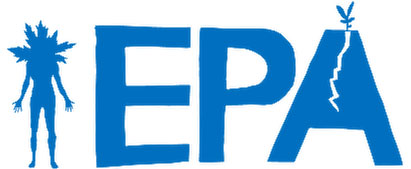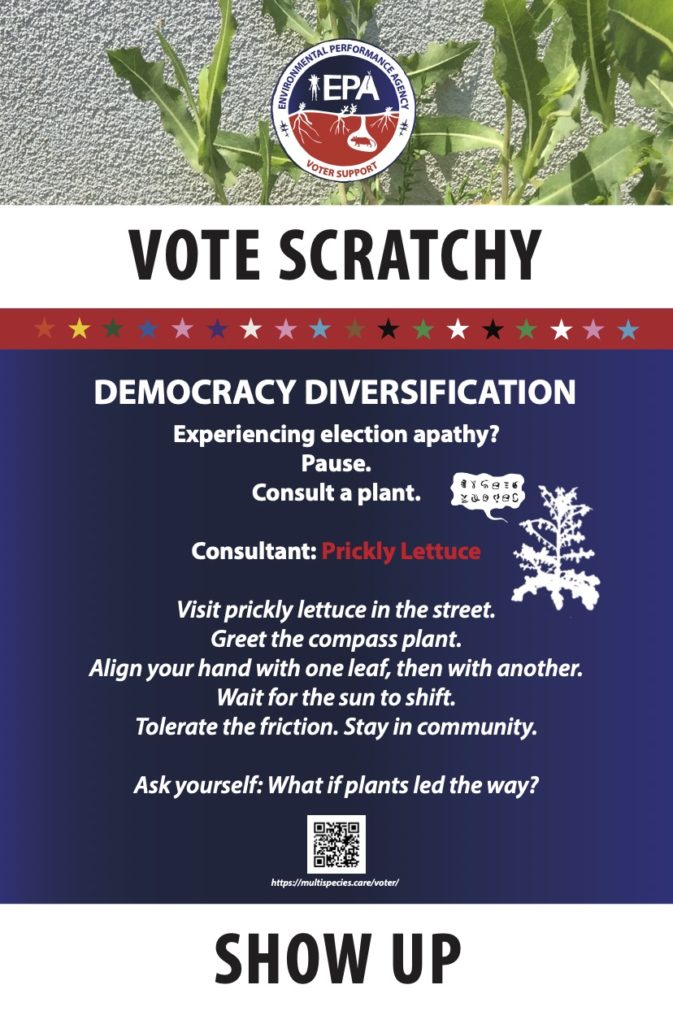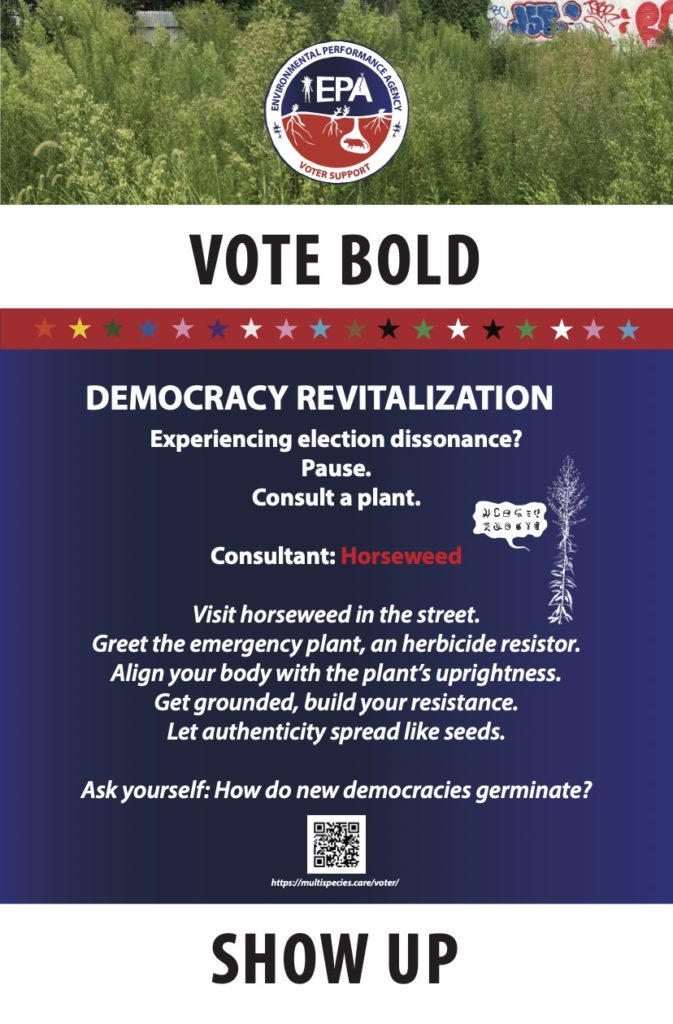EPA Voter Support
Prickly lettuce, Horseweed, and Tree-of-heaven invite you to show up this election season. Download and print these poster if you can commit to pasting them up in the street (guidelines below!). Physical copies are available at the exhibition Novel Ecosystems from April 19-July 7, 2024 at St Kate in Milwaukee, WI. Scroll to the end of some resources and reading on multispecies politics, alternative and radical forms of democracy.
Wheat Pasting Guidelines
MAKE A COMMITMENT
Prickly lettuce, Horseweed, and Tree-of-Heaven each have their own poster, inviting you to show up this election season. Take one of each plant poster type, or commit to pasting up as many as nine. Your participation counts! The plants are waiting for you in the street!
MAKE THE WHEAT PASTE
Wheatpaste is a quick, easy, cheap, and nontoxic way to make glue for pasting up posters on urban surfaces. Here’s how to make it:
YOU WILL NEED (for 6 cups of glue)
- 1/2 cup whole wheat flour
- cold water
- 6 cups boiling water in a pan on the stove
- 1 Tbl of sugar (optional)
- Container with lid for paste
INSTRUCTIONS
- Sift the flour into a bowl and slowly stir in cold water until you reach the consistency of pancake batter.
- Slowly pour your mixture into the boiling water and stir to combine. Stir on low boil for 1-2 minutes until the mixture thickens a bit.
- You may add sugar to boost stickiness at this point.
- Once the wheat paste reaches a smooth and glue-like consistency, turn off the heat, let it cool a little, then pour the paste into your container.
* You can use the wheat paste warm or cold. If you let it cool, add extra water because the paste will thicken the longer it cools. Use wheat paste fresh within a few days.
SHOW UP: FIND LOCATIONS TO PASTE YOUR POSTERS!
Take your poster(s),your wheat paste container and a paint brush with you. Move through a neighborhood you know. Try to locate Prickly lettuce, Horseweed, and Tree-of-Heaven. Use the text on the posters to attune to the plants. Observe until you identify some places to paste the posters. Take cues from the plants.
WARNING! Be aware of the legal risks of placing wheat pasting posters on public/private property. You can get fined or more if you get caught. Take a friend with you to watch out for you, and don’t take risks you’re not comfortable with.
INSTRUCTIONS FOR PASTING: Use your brush to scoop, paste and paint a thick layer on the wall or surface. Stick the plant poster on to the wet surface. Apply a thin layer of wheat paste on top of the plant poster to seal it in, esp. on corners.
Take a Breath. Thanks for Showing Up!
Resources and Further Reading
- Pella Thiel: “Criminalizing Ecocide: The Rights of Nature” on The Great Simplification, May 2024
- Rights for the rivers: Groups fight for recognition of natural entities’ legal rights, NPR, July 2023
- “There’s a growing movement that calls for granting legal rights to natural entities like forests and rivers. Indigenous groups say it should definitely hold true for the Mississippi river and others.”
- Icelandic glacier running for president, BBC news, April 2024
- “A glacier called Snæfellsjökull is in the running for the presidential race….Dr Angela Rawlings is the founder of the campaign to get the glacier into the running. She changed her middle name to that of the glacier’s so it can appear on the nomination list. She says the glacier is ‘running for president’ on a ticket of ‘transparency and sustainability’, and will ‘amplify the voices of those most affected by the climate emergency’.”
- Maine Joins National Popular Vote Compact, Democracy Now, April 2024
- “Sixteen states and Washington, D.C., have now pledged to award their combined 209 electoral votes to the presidential candidate who wins the nationwide popular vote. The compact will only go into effect once supporters of the compact control at least 270 votes. Support for the National Popular Vote compact has grown in recent years after both George W. Bush and Donald Trump were elected president despite losing the popular vote.”
- Democracy is a Verb, Astra Taylor on Team Human, 2019
- “Do we really have a clear vision and political imagination of what democracy should look like? How can we both recognize the tensions in democracy and create conditions where these contradictions are more constructive than destructive? In what ways are we empowered in our everyday lives to enact democracy?”
- Young voters helped Biden to victory. They may abandon him this year, The Guardian, January 2024.
- “Voting bloc who supported Biden in 2020 over climate change see war in Gaza as environmental justice issue”
- The anti-war protest secured a huge primary vote. What happens next?, The Guardian, March 2024
- “Thousands registered their opinion against the war in Gaza through the ballot, showing Biden it could sway the election”
- Multispecies Sustainability (Rupprecht CDD et al. (2020). Multispecies sustainability. Global Sustainability 3, e34, 1–12. https://doi.org/ 10.1017/sus.2020.28)
- “The sustainability concept seeks to balance how present and future generations of humans meet their needs. But because nature is viewed only as a resource, sustainability fails to recognize that humans and other living beings depend on each other for their well-being. We therefore argue that true sustainability can only be achieved if the interdependent needs of all species of current and future generations are met, and propose calling this ‘multispecies sustainability’. We explore the concept through visualizations and scenarios, then consider how it might be applied through case studies involving bees and healthy green spaces.”
- Asenbaum, H., Machin, A., Gagnon, JP. et al. The nonhuman condition: Radical democracy through new materialist lenses. Contemp Polit Theory 22, 584–615 (2023). https://doi.org/10.1057/s41296-023-00635-3



